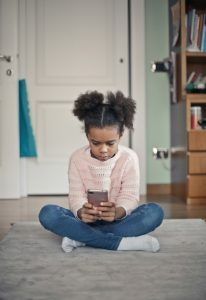
Photo by LinkedIn Sales Solutions on Unsplash
This module, the Power of Stories, feels incredibly relevant right now. So many people’s stories historically have been erased, and when we have an administration that is actively erasing the stories of people of color and their contributions to this country, it feels more important than ever before to preserve real human stories about the human experience. This is why I find the idea of a human library so intriguing. This seems like such a wonderful and somewhat simple way to forge connection. We talk about books as mirrors (reflecting yourself), windows (allowing someone to peer into another world/perspective) and sliding glass doors (finding the connections between us all), but how powerful this would be if demonstrated, created, discovered through actual human dialogue and connection. More than ever, I feel we need all of us to see each other for exactly who we are- individuals influenced by the history, culture, families, and thoughts that made us- grasping for our similarities and leading with love, not hate.
I do have some questions, which I perhaps will be able to answer through perusing the Human Library Organisation site, but I do wonder how a “book” is chosen. Is there an interview process? Does the “book” need to have any specific qualifications? Do “books” volunteer their time? What happens if a reader does not like what they learn from a “book”? Are their protections in place to try to alleviate triggers or trauma for “books” and readers? Are certain topics off limits?… Humanity is messy, is/can the human library be different?
References
Wentz, E. (2013, April 26). The human library: Sharing the community with itself. Public Libraries Online. https://publiclibrariesonline.org/2013/04/human_librar/.
 For me, as someone who is hoping to become a children’s librarian, I can see how this will greatly influence how I will approach the children’s area of the library, not only as a place for books, reading, and learning, but also a place for play, community, and connection. I want to also highlight what Pam Sandlian Smith stated in her TedTalk video. She stated, “You can learn anything if you make it playful.” Again, this is essentially the prevailing belief when it comes to early childhood education—children learn through their play. So, why wouldn’t a library space meant for children, be a space that also promotes play. I loved the example that Professor Stephens gave in his lecture, the picture showing how the library stacks doubled as a climbing space. How creative, and how fun! I would have loved to read on top of one of those shelves when I was a kid. I can’t wait to create spaces like that for the future children that I hope to serve.
For me, as someone who is hoping to become a children’s librarian, I can see how this will greatly influence how I will approach the children’s area of the library, not only as a place for books, reading, and learning, but also a place for play, community, and connection. I want to also highlight what Pam Sandlian Smith stated in her TedTalk video. She stated, “You can learn anything if you make it playful.” Again, this is essentially the prevailing belief when it comes to early childhood education—children learn through their play. So, why wouldn’t a library space meant for children, be a space that also promotes play. I loved the example that Professor Stephens gave in his lecture, the picture showing how the library stacks doubled as a climbing space. How creative, and how fun! I would have loved to read on top of one of those shelves when I was a kid. I can’t wait to create spaces like that for the future children that I hope to serve. their own, they must be taught. And I feel that the eight digital skills laid out by Yuhyun Park (2016) are of most importance.
their own, they must be taught. And I feel that the eight digital skills laid out by Yuhyun Park (2016) are of most importance.